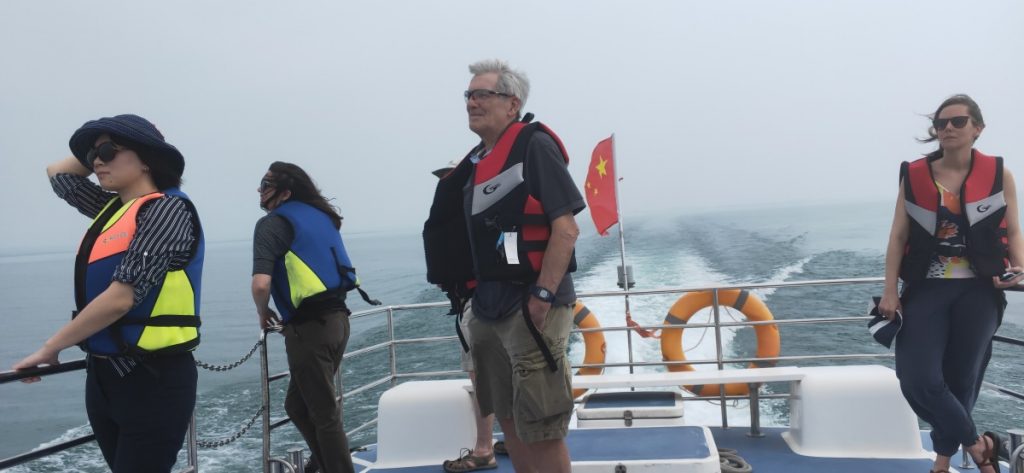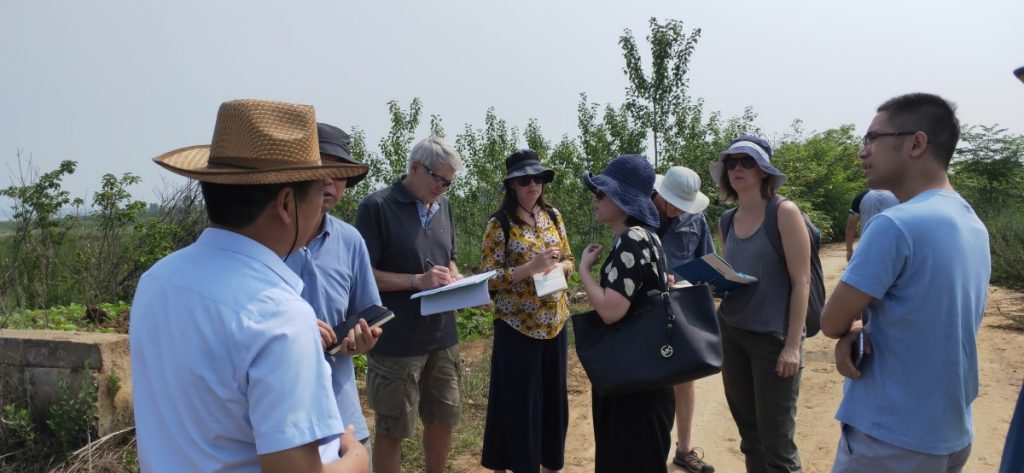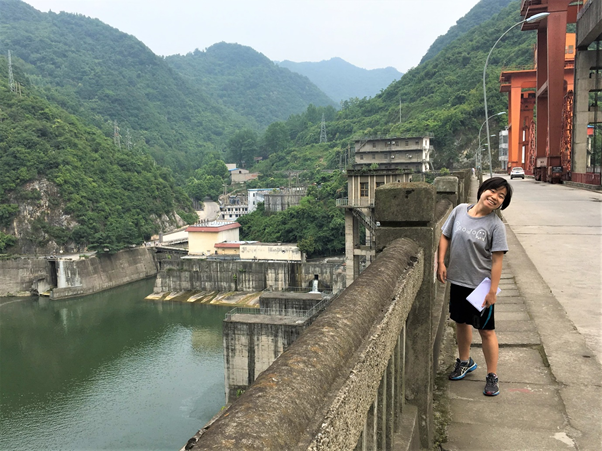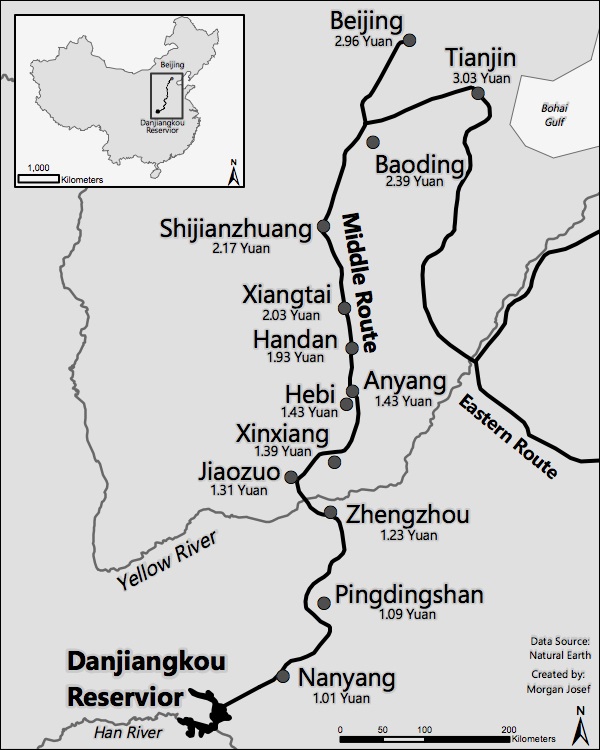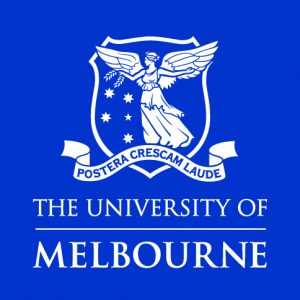Interrogating the technopolitics of China’s waterways
Dr Michael Webber, based at the University of Melbourne in Australia, is part of a team that is assessing China’s South-North Water Transfer Project. The findings will highlight the importance of scrutinising the impacts of major initiatives such as this
The South-North Water Transfer (SNWT) Project is one of the most ambitious and expensive engineering projects that has ever been conceived. The ultimate aim of the project is to divert 44.8 billion cubic metres of water per year from the Yangtze River in southern China to the Yellow River Basin in northern China, in a bid to ensure that there is more water for industries and cities in the north.
But at what cost? It is said that hundreds of thousands of people will be displaced by the project, with an estimated 330,000 people being relocated for the expansion of the Danjiangkou Reservoir. Then we might ask what the environmental costs of a project such as this are. China is an unimaginably large country. It is home to almost 1.4 billion people and covers approximately 9.6 million square kilometres, making it one of the world’s largest countries by area. Diverting water from the south to the north is a serious undertaking and a team of researchers have set about interrogating the socio-economic, environmental and political implications of the project.
WHY IS THE SNWT PROJECT SO INTERESTING TO THE TEAM?
Dr Michael Webber is a geographer based at the University of Melbourne in Australia. He leads the team analysing the SNWT project – research that forms part of a bigger ambition of his. For the past 25 years, Michael has been studying the ways the modernisation of China has changed everyday life there. As a geographer, he wants to document how big changes in the way we organise societies affect the lives of ordinary people. His approach to this quest is armed with several key ideas. “It is a fundamental fact of geography that the ways in which societies are organised are different in different places,” says Michael. “Then there is the fact that societies aren’t just people – they are an interaction between people, institutions and environments. Finally, I think of scale – the pathways through which big changes filter down to the opportunity for a new job here, or the loss of a farm there.”
The SNWT project brings all of these key ideas together, making it the perfect topic of enquiry for Michael and his team.
HOW DOES TECHNOPOLITICS FILTER THROUGH TO MICHAEL’S RESEARCH?
That the SNWT project has been given the go-ahead is a technopolitical decision – it uses technology in ways that are designed or used to constitute, embody or enact political goals. “Technical water management choices in China are influenced by current political-economic forces, but also constrained by technical choices inherited from the past, and to some extent promoted by international actors,” says Michael. “Engineered infrastructures, while ‘thick’ with politics, are only one element of a broader techno-political water management regime comprised of linked sets of people, engineering, and industrial practices, technological artefacts, political programmes, and institutional ideologies.”
WHAT CHALLENGES DOES THIS PROJECT POSE FOR MICHAEL?
One of the key elements of Michael’s project is to link decisions made at the level of the central government in Beijing to actions and decisions made by local governments, and on to what happens to the lives of local people, in Beijing and along the routes taken by the project. Michael has learned Mandarin so that he is able to read the necessary documents, find the required data about social and biophysical processes, talk to appropriate officials, and meet with ordinary people. “A lot depends on our physical presence in the field, talking to officials, factory managers and farmers,” explains Michael. “Doing this kind of research is not easy – we need an official organisation in China to sponsor us; we need an easy familiarity with living and working in China; we need to be able to communicate in the official language and in local dialects; we need to be able to spend hours walking around villages in the sun, talking to people; we have to arrange transport to get around.”
WHAT ARE THE KEY SOCIO-ECONOMIC, ENVIRONMENTAL AND POLITICAL IMPLICATIONS OF THIS PROJECT?
Michael is keen to emphasise how the project reflects the distribution of power in China, that the central government has greater capacity to invest billions in an infrastructure scheme than to reform water management systems in which local jurisdictions have a high degree of local autonomy and little incentive to manage water at the expense of jobs. The project is consistent with a model of growth that came about in the 1990s and 2000s, that was dominated by investment, including central government-led investment.
Substantial changes in the management of water resources are happening in China, which is a cause for alarm. Diverting water from the south to the north to support industries and cities sounds like a positive idea at first glance, but you have to ask yourself: from whom is the water being diverted?
 DR MICHAEL WEBBER
DR MICHAEL WEBBER
School of Geography, The University of Melbourne, Australia
FIELD OF RESEARCH: Geography
RESEARCH PROJECT: Michael’s research is concerned with analysing China’s South-North Water Transfer Project with several key ideas in mind. The findings highlight the need to interrogate the socio-economic, environmental and political implications of such projects.
FUNDER: ARC Discovery Project, entitled The Technopolitics of China’s South-North Water Transfer Project (DP170104138).
 EXPERIENCE OF A PHD STUDENT
EXPERIENCE OF A PHD STUDENT
Hong Jiang is a PhD student who works with Michael as a research assistant. Her PhD project is focused on the geomorphic changes in the Han River channel and its floodplain.
WHAT HAVE YOU GAINED FROM WORKING ON THIS PROJECT?
By collaborating and meeting regularly with other team members in this project, my research interests have expanded from my initial starting point as a typical physical geographer into the livelihood and management field. My experiences in this project have pushed me to think across disciplinary boundaries.
WHERE DO YOU SEE YOUR CAREER LEADING?
My career plan is to work as a researcher in a water-related field in universities or international research institutes. My special interests are environmental changes and the impact the process of river-related resource exploitation and management has on local community livelihood.
WHAT AMBITIONS DO YOU HAVE FOR THE FUTURE?
From a research perspective, I hope to apply more cross-disciplinary cooperation in future research projects. My ambition is to promote the Land-Trust Nature Reserve Paradigm and contribute to its implementation in more places.
Reference
https://doi.org/10.33424/FUTURUM72
On the Yangtze River Conservancy Commission’s boat, Danjiangkou Reservoir. Photo by ZHAO Yue
Talking to an official from the Yangtze River Conservancy Commission. From the left: the official, Professor Wang [partially hidden], me, Dr Lamb, Dr Jiang, Professor Rutherfurd, Dr Rogers, another official. Photo by ZHAO Yue
But at what cost? It is said that hundreds of thousands of people will be displaced by the project, with an estimated 330,000 people being relocated for the expansion of the Danjiangkou Reservoir. Then we might ask what the environmental costs of a project such as this are. China is an unimaginably large country. It is home to almost 1.4 billion people and covers approximately 9.6 million square kilometres, making it one of the world’s largest countries by area. Diverting water from the south to the north is a serious undertaking and a team of researchers have set about interrogating the socio-economic, environmental and political implications of the project.
WHY IS THE SNWT PROJECT SO INTERESTING TO THE TEAM?
Dr Michael Webber is a geographer based at the University of Melbourne in Australia. He leads the team analysing the SNWT project – research that forms part of a bigger ambition of his. For the past 25 years, Michael has been studying the ways the modernisation of China has changed everyday life there. As
a geographer, he wants to document how big changes in the way we organise societies affect the lives of ordinary people. His approach to this quest is armed with several key ideas. “It is a fundamental fact of geography that the ways in which societies are organised are different in different places,” says Michael. “Then there is the fact that societies aren’t just people – they are an interaction between people, institutions and environments. Finally, I think of scale – the pathways through which big changes filter down to the opportunity for a new job here, or the loss of a farm there.”
The SNWT project brings all of these key ideas together, making it the perfect topic of enquiry for Michael and his team.
HOW DOES TECHNOPOLITICS FILTER THROUGH TO MICHAEL’S RESEARCH?
That the SNWT project has been given the go-ahead is a technopolitical decision – it uses technology in ways that are designed or used to constitute, embody or enact political goals. “Technical water management choices in China are influenced by current political-economic forces, but also constrained by technical choices inherited from the past, and to some extent promoted by international actors,” says Michael. “Engineered infrastructures, while ‘thick’ with politics, are only one element of a broader techno-political water management regime comprised of linked sets of people, engineering, and industrial practices, technological artefacts, political programmes, and institutional ideologies.”
WHAT CHALLENGES DOES THIS PROJECT POSE FOR MICHAEL?
One of the key elements of Michael’s project is to link decisions made at the level of the central government in Beijing to actions and decisions made by local governments, and on to what happens to the lives of local people, in Beijing and along the routes taken by the project. Michael has learned Mandarin so that he is able to read the necessary documents, find the required data about social and biophysical processes, talk to appropriate officials, and meet with ordinary people. “A lot depends on our physical presence in the field, talking to officials, factory managers and farmers,” explains Michael. “Doing this kind of research is not easy – we need an official organisation in China to sponsor us; we need an easy familiarity with living and working in China; we need to be able to communicate in the official language and in local dialects; we need to be able to spend hours walking around villages in the sun, talking to people; we have to arrange transport to get around.”
WHAT ARE THE KEY SOCIO-ECONOMIC, ENVIRONMENTAL AND POLITICAL IMPLICATIONS OF THIS PROJECT?
Michael is keen to emphasise how the project reflects the distribution of power in China, that the central government has greater capacity to invest billions in an infrastructure scheme than to reform water management systems in which local jurisdictions have a high degree of local autonomy and little incentive to manage water at the expense of jobs. The project is consistent with a model of growth that came about in the 1990s and 2000s, that was dominated by investment, including central government-led investment.
Substantial changes in the management of water resources are happening in China, which is a cause for alarm. Diverting water from the south to the north to support industries and cities sounds like a positive idea at first glance, but you have to ask yourself: from whom is the water being diverted?
 DR MICHAEL WEBBER
DR MICHAEL WEBBER
School of Geography, The University of Melbourne, Australia
FIELD OF RESEARCH: Geography
RESEARCH PROJECT: Michael’s research is concerned with analysing China’s South-North Water Transfer Project with several key ideas in mind. The findings highlight the need to interrogate the socio-economic, environmental and political implications of such projects.
FUNDER: ARC Discovery Project, entitled The Technopolitics of China’s South-North Water Transfer Project (DP170104138).
 EXPERIENCE OF A PHD STUDENT
EXPERIENCE OF A PHD STUDENT
Hong Jiang is a PhD student who works with Michael as a research assistant. Her PhD project is focused on the geomorphic changes in the Han River channel and its floodplain.
WHAT HAVE YOU GAINED FROM WORKING ON THIS PROJECT?
By collaborating and meeting regularly with other team members in this project, my research interests have expanded from my initial starting point as a typical physical geographer into the livelihood and management field. My experiences in this project have pushed me to think across disciplinary boundaries.
WHERE DO YOU SEE YOUR CAREER LEADING?
My career plan is to work as a researcher in a water-related field in universities or international research institutes. My special interests are environmental changes and the impact the process of river-related resource exploitation and management has on local community livelihood.
WHAT AMBITIONS DO YOU HAVE FOR THE FUTURE?
From a research perspective, I hope to apply more cross-disciplinary cooperation in future research projects. My ambition is to promote the Land-Trust Nature Reserve Paradigm and contribute to its implementation in more places.
ABOUT GEOGRAPHY
Eratosthenes coined the term ‘geography’ (albeit in Greek). He was the first person to measure the size of Earth (as far as the details are known) and correctly assumed that the Sun’s distance from our planet was rather large. Since then, geography has developed significantly and is rightly recognised as a field of study that crosses the boundaries of science and social science/humanities. As such, it offers students virtually boundless opportunities. No single career can be said to be the natural product of a geography degree. Instead, it is often thought of as the foundation of something more nuanced.
HOW IMPORTANT IS COLLABORATION IN GEOGRAPHY?
Vital. “I need to be able to work with people who are experts in social science and the more social aspects of geography, as well as with people who are experts in the biophysical environment and engineering,” explains Michael. “Then, too, we need people who have more general knowledge about the specific place we are working in. An understanding of where we are, how we got here, and what we should do about the future demands that we bring together all these skills.”
There is also the fact that people in different disciplines approach problems from different mindsets – all bring fresh perspectives that are essential to overcoming challenges; some disciplines look more for deeper understanding, whereas others seek ways to build on what we know.
WHAT ARE THE MOST PRESSING ISSUES FACING TODAY’S GEOGRAPHERS?
The most pressing issues facing geographers are arguably those facing the rest of the world – environmental changes and inequality. “Geographers are among a host of disciplines and individual scientists who are studying these issues,” says Michael. “We bring an understanding of integrated social-environmental-technological systems that are different in different places and that are linked in a scalar network of causes and effects.”
HOW TO BECOME A GEOGRAPHER
• The Geography Site brings together a wide range of academic geographical organisations that will provide you with a massive amount of useful information.
www.geography-site.co.uk
• The National Committee for Geographical Sciences aims to foster geography in Australia.
www.science.org.au
• The average salary for a geographer is AUS $115,265, depending on experience. Entry level geographers can expect around AUS $81,276 while those at senior level can expect AUS $143,174.
www.salaryexpert.com/salary/job/geographer/australia
PATHWAY FROM SCHOOL TO GEOGRAPHY
Michael is unequivocal about doing the subjects you are interested in and are relatively good at (although being interested in subjects is often the first means of being good at them). “Geographers can supplement their core geographic studies with subjects like economics (which is what I did), sociology, politics, chemistry, geology, meteorology or biology – depending on what kind of geography they are most interested in,” explains Michael. “A second language is always helpful too.”
2 or 3 A levels, or equivalent.
A geography degree is one possibility, but that will open doors to so many different careers, including landscape architect, environmental manager, cartographer and transport planner. As a classic generalist degree, a geography qualification really does mean the world is your oyster!
www.prospects.ac.uk/careers-advice/what-can-ido-with-my-degree/geography
HOW DID DR MICHAEL WEBBER BECOME A GEOGRAPHER?
WHAT WERE YOUR INTERESTS AS A CHILD?
I was interested in sport, particularly rugby and cricket, but there was a range of subjects that I enjoyed too. I was most interested in geography, history and biology, although I wasn’t too good at biology!
WHO OR WHAT HAS INSPIRED YOU IN YOUR CAREER?
I grew up in two different environments – in a coal-mining town in South Wales and later in a small town in the west of England. The contrast between these two, in terms of my life and the lives of adults, was profound – the dangers of work, the amount of open space, the population density, the standards of living and the life chances of kids were all so different. It was almost like being in two different countries. I also had a great geography teacher at school, who just happened to be my mother!
WHAT HAVE BEEN SOME OF YOUR PROUDEST ACHIEVEMENTS?
I have written what I think are two or three really good books. I have also supervised some excellent PhD students, which makes me proud. Then there is the fact I have led some elegantly designed and well executed research projects.
HOW DO YOU OVERCOME OBSTACLES IN YOUR WORK?
Seek help and listen. It took me a long time to learn to do this – but listen to all the advice you can get from as many sources as possible, and then try to make a decision that reflects the best advice and your own goals. Persistence is key too – some things are just difficult and require time and effort to get them done. Learning Chinese is one of those tasks – it is a daily commitment, demanding an hour or two every day, no matter what else has to be done. Thankfully, I have got to the level where I can read enough to do the work I need to do!
WHAT GOALS DO YOU HAVE LEFT TO ACHIEVE?
I aim to supervise my existing PhD students to do the best they can and also lead this project to the best of my ability. I hope to publish useful contributions to knowledge about the China’s South-North Water Transfer Project and about ways of understanding similar projects.
MICHAEL’S TOP TIPS
1 Enjoy yourself! If you are going to work within a specific field – whatever it is – you are going to spend a lot of time doing it. If you don’t enjoy it and don’t think you are making a valuable contribution, you are going to spend a good part of your life feeling ordinary at best and, perhaps, even miserable.
2 Find an environment where you can do what you like best about your specialty. Do you like doing research? Then look for a university, research institute or company where you can advance your career while still doing research. Do you like applying the research that you find out about? Then look for places, like planning or environment departments, where you can do that. Do you like the idea of managing projects and people? Then look for organisations where you spend some time researching or applying research before entering a more management-oriented track.
3 If you like communicating current ideas and research in geography, then a career in journalism or teaching might be for you.




